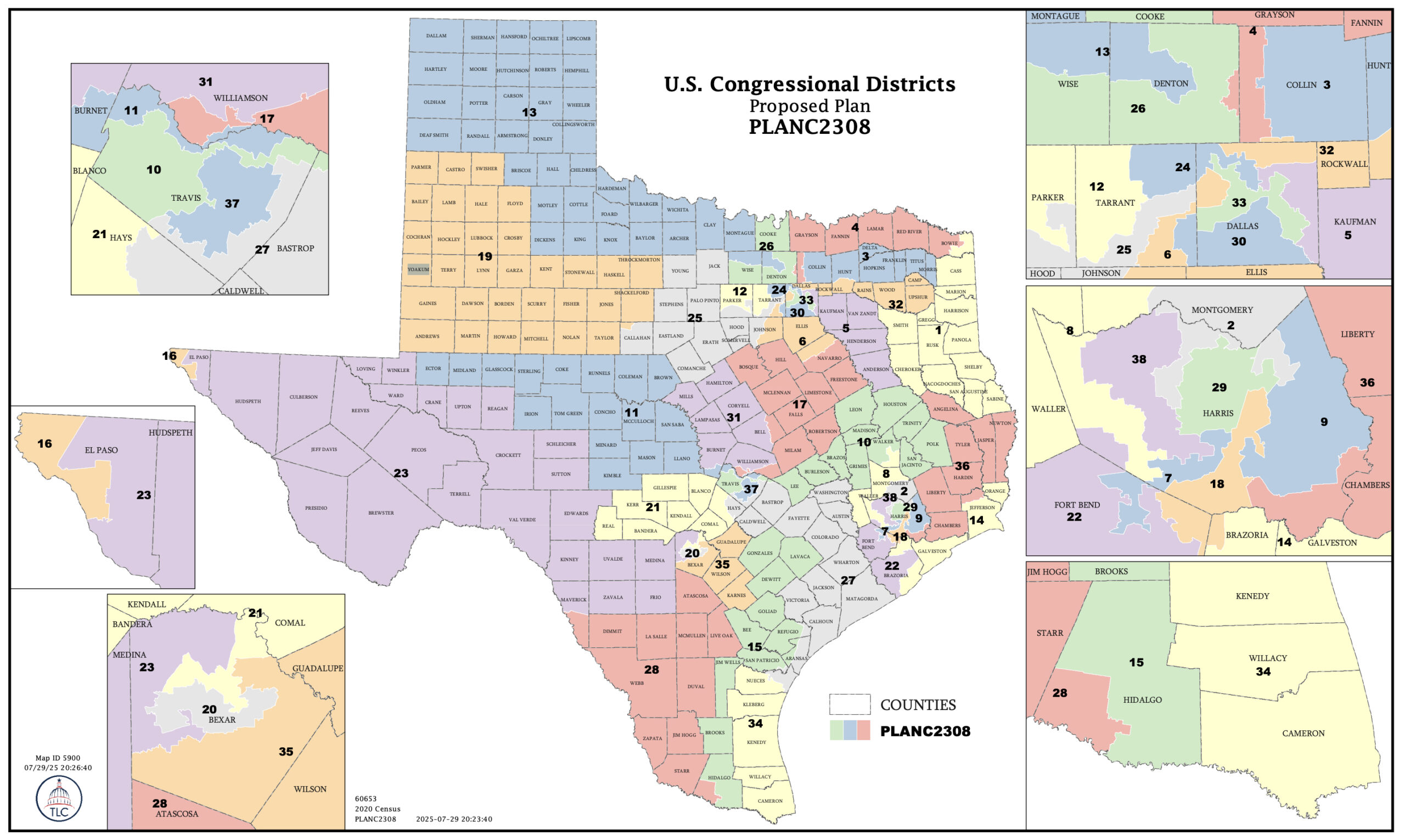By Jim Ellis — Friday, Aug. 22, 2025
Texas
REDISTRICTING — The Texas state House of Representatives, with the Democrats returning to create a quorum, passed the new redistricting map on a party line vote. The bill then moved to the state Senate where passage became pro forma since the body passed the plan in the previous legislative special session. Gov. Greg Abbott (R) is expected to sign the new map into law as early as today.
While Republicans believe they can gain five seats in the Texas delegation, the number is largely predicated on winning Hispanic voters in numbers that President Trump similarly attained. Whether the new Trump Hispanic voter returns in a midterm election to vote the Republican line becomes a point of conjecture.
The new Texas map creates three open seats, two of which, one in Houston and the other in the San Antonio area, have large Hispanic populations. To reach their goal of converting five districts, the Republican candidates will have to carry the three open seats:
- District 9 (Houston)
- District 32 (Dallas area)
- District 35 (San Antonio area)
Also, Republicans must defeat Reps. Henry Cuellar (D-Laredo) and Vicente Gonzalez (D-McAllen) in South Texas Districts 28 and 34, respectively.
Former Congresswoman Mayra Flores (R), who lost to Rep. Gonzalez 51-49 percent in November while President Trump was carrying the 34th District in the present configuration (51.8 – 47.4 percent), announced earlier in the year that she would move to District 28 to oppose Rep. Cuellar. Since District 34, now moving northward toward Corpus Christi and losing the McAllen portion of the current CD, becomes more Republican it is unclear if she will go through with the plan to run in CD-28 or return for a second re-match with Rep. Gonzalez in new CD-34.
The new map pairs several Democratic members: Reps. Lloyd Doggett (D-Austin) and Greg Casar (D-Austin), although Rep. Doggett is saying he will retire if this map stands; likely, Reps. Julie Johnson (D-Farmers Branch/Dallas) and Marc Veasey (D-Ft. Worth) in a Dallas County 33rd District that would contain neither of their home bases; and Rep. Al Green (D-Houston) with the winner of the TX-18 special election to be held later this year.
Rep. Chip Roy (R-Austin) — Rep. Roy, who had been publicly contemplating entering the open Texas Attorney General’s race, yesterday announced his candidacy for that position, thus opening his Central Texas 21st Congressional District for the 2026 election cycle.
Counting the Roy open seat along with the Texas trio of new open CDs, the national US House open seat count would rise to 29 (15R-11D-3 New).
Once the four special elections are filled beginning on Sept. 9 in Virginia with the VA-11 district and concluding with TX-18, which could stretch into January (under Texas election law, the Governor calls a special runoff once it becomes certain that the top finisher will not reach the majority support level in the initial election), the national open-seat count will revert to 25.
In the GOP Attorney General’s primary, Congressman Roy will face state Sen. Mayes Middleton (R-Galveston), state Sen. Joan Huffman (R-Houston), former Assistant US Attorney General Aaron Reitz, and possibly others. For the Democrats, state Sen. Nathan Johnson (D-Dallas) and former Galveston Mayor and ex-AG candidate Joe Jaworski are the announced contenders.
The new 21st District will be similar but not identical to the seat that Rep. Roy is vacating. The new TX-21 will contain northern Bexar County (San Antonio), move north to capture Comal and part of Hays County which borders Austin, and then travels west into the Texas Hill Country to include the flood-ravaged area around Kerrville when the Guadalupe River overflowed on the 4th of July.
The current CD-21 partisan lean is 61.0R – 36.7D. The new 21st would lose about 30 percent of the territory to other districts but gain a commensurate amount. The new partisan lean, again through the work of the Dave’s Redistricting App statisticians, would calculate as a similar 60.3R – 38.4D. Therefore, it is highly likely that Rep. Roy’s successor will be the winner of the next Republican nomination campaign.

